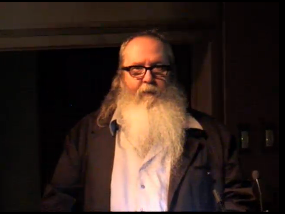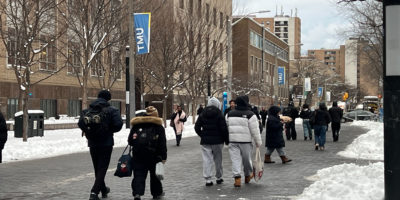By Jasmine Pazzano
A burly man stands at the podium, his long, grey beard resembling Santa Claus’. He talks faintly into the microphone, and a modest smile occasionally crosses his aged face. His appearance seems an odd contrast to his photograph on the screen behind him— a green-tinted image that depicts a naked man with a joint dangling from his finger.
He is known as Evergon. A leading figure in the world of contemporary photography spoke at Ryerson University this month.
The Niagara Falls native has created unique collections since the start of his professional career 30 years ago. Most of his series revolve around his main interest of gay male culture. His bold work has helped him create an edgy identity in the photography industry.
After he dropped his birth name, Celluloso Evergonni, he established himself as Evergon through his signature Polaroid prints. He said he would use a large-format Polaroid camera to produce as large as 1-by-2 metre prints.
When he worked in New York City during the 1980s, he created two series. In his Cirque collection, he said the models stood still on giant wooden balls and balanced themselves for minutes to wait for the picture to take. “All I can say is the models were so good,” he said.
He said the making of Cirque was expensive. He said it cost him US$250 to produce each technically-correct print, which made retakes a huge dilemma. “But, I was so addicted. I just wanted to keep making images.”
In his other New York series, Ram Boys, he said his male models posed, often nude, with taxidermy moose heads and porcelain ram masks.
One of the most deviant aspects of his work is his choice of models. He photographed his then 80-year-old mother naked in his series Margaret and I. He said he likes to find older couples to model in his photos, but ones that are willing are hard to find.
Photos of himself in the nude can be found in many of his collections, whether he is in the background of a mirror image of a model or posing with other men.
His work is not appreciated by everyone. His photos were banned from an art show in New York City because his pictures were deemed “too promiscuous.” In England, Ram Boys was cut out of a show. “They said the man in the photo was being too rough with the animals,” Evergon said.
Last week, he opened a show at Concordia University in Montreal about partners and sexuality. He said he also mentors gay men on the same subject. But, he said he feels his work is done. He said this is because half of the models featured in his collections have died from AIDS. He said it’s also in part by what he feels is the extinction of Polaroids. “I’ve lost my medium. I’m desperately searching for one that gives me pleasure.”
Evergon’s presentation is part of the Ryerson Lecture Series, inviting professionals and artists to speak to students.












Leave a Reply